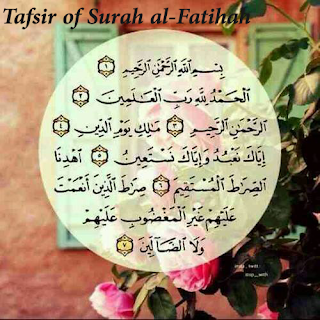1. Surah al-Fatihah is the greatest surah in the Quran.
2. There is no surah similar to surah al-Fatihah in the former divine Scriptures. Abu Hurairah, may Allah be pleased with him, reported that Messenger Muhammad called Ubayy bin Ka’b while he was praying. However, Ubayy did not respond and finished his prayer quickly. Then he went to Messenger Muhammad and greeted him saying, ‘Peace be upon you, O Messenger of Allah.’ Messenger Muhammad said, ‘And upon you. What prevented you from responding to me when I called you?’ Ubayy said, ‘O Messenger of Allah, I was praying.’ He said, ‘Have you not heard this ayah: [O you who believe, obey Allah and the Messenger when he calls you to what gives you life.] [Q. Surah al-Anfal:24].’ Ubayy said, ‘I heard it, O Messenger of Allah. I promise you I will not do so again.’ Then Messenger Muhammad said, ‘Would you like that I teach you a surah the like of which has neither revealed in the Torah, nor the Psalms, nor the Gospel, nor the Quran?’ Ubayy said, ‘Yes, O Messenger of Allah.’ Messenger Muhammad said, ‘I hope that you will not go out through this door before you learn it.’ Then Messenger Muhammad held my hand and kept talking to me. I feared that he might reach the door before he finished his conversation. When he was close to the door, I said, ‘O Messenger of Allah, what is the surah that you have promised me to teach me.’ He said, ‘What do you recite in the prayer?’ I recited surah the Mother of the Quran to him.’ Thereupon, Messenger Muhammad said, ‘By the One in whose Hands my soul is, Allah has never revealed in the Torah, nor the Gospel, nor the Psalms, nor the Quran like it. It is the seven oft-repeated Ayat [Musand Imam Ahamd].’
3. Surah al-Fatihah is light. Imam Muslim narrated in his Sahih, ‘Rejoice at two lights that you have been given, which they were not given to any prophet before you. They are the Opening of the Book and the concluding Ayat of surah al-Baqarah. You will not recite a letter therefrom, but you will be rewarded for it [Musand Imam Ahamd].’
4. Surah al-Fatihah is a Ruqya (supplication by using ayat from the Quran, authentic prophetic supplication for warding off harm and diseases). Abu Sa’id al-Khudri, may Allah be pleased with him, said, ‘We were on a journey and dismounted at a place. Then a slave girl came to us and said, ‘The chief of this tribe has been stung by a scorpion. Our men are not present. Is there anybody among you who can treat him by reciting some ruqya?’ Then a man, whom we thought that he could not treat by using ruqya, went with her. He treated him with a ruqya and the chief was cured. Then the chief gave him thirty sheep and gave us milk to drink as a reward. When the man returned, we said to him, ‘Did you know how to treat with ruqya?’ He said, ‘No, but I only treated him by reciting surah the mother of the Book.’ Then we said, ‘Do not do anything until we meet Messenger Muhammad and ask him.’ When we reached al-Madinah, we told Messenger Muhammad about the matter. He said, ‘How did you know that surah al-Fatihah could be used as a ruqya? Distribute the reward among you and give me a share thereof [Sahih al-Bukhari].’
5. The prayer of a person, who does not recite surah al-Fatihah, is deficient. Abu Hurairah, may Allah be pleased with him, reported that Messenger Muhammad said, ‘Whoever prays a prayer without reciting the Mother of the Book, then his prayer is deficient.’ He repeated so thrice. It was said to abu Hurairah, ‘We just pray behind the imam.’ He said, ‘Recite it within yourself. I heard Messenger Muhammad say, ‘Allah, Exalted be He, says, ‘The prayer is divided between Me and My slave into two halves. And My slave will attain what he asks for. When the slave says, [All praise is due to Allah, the Lord of the worlds.], Allah says, ‘My slave has praised Me.’ When the slave says, [The Giver of Mercy, the Most Merciful.], Allah says, ‘My slave has extolled Me.’ When the slave says, [The Master of the Day of Judgment.], Allah says, ‘My slave has glorified Me.’ When the slave says, [You alone we worship and You alone we ask for help. ], Allah says, ‘This is between Me and My slave and My slave will attain what he asks for.’ When the slave says, [Guide us to the straight path. The path of those You have blessed, not of those who have incurred wrath, nor those who have gone astray.], Allah says, ‘This is for My slave and My slave will attain what he asks for [Sahih Muslim].’

No comments:
Post a Comment